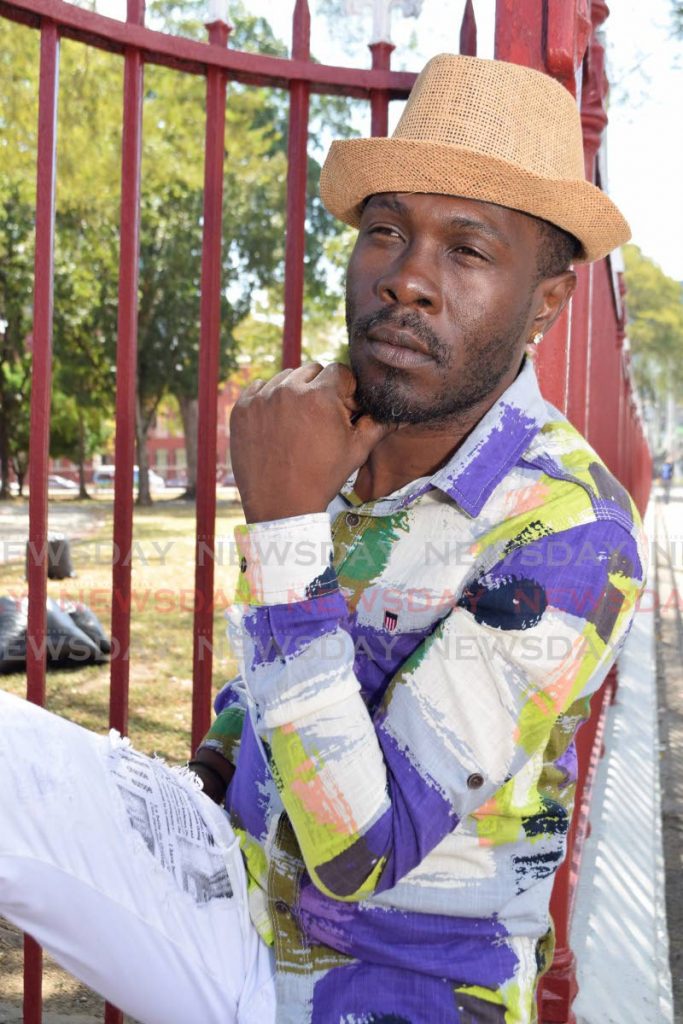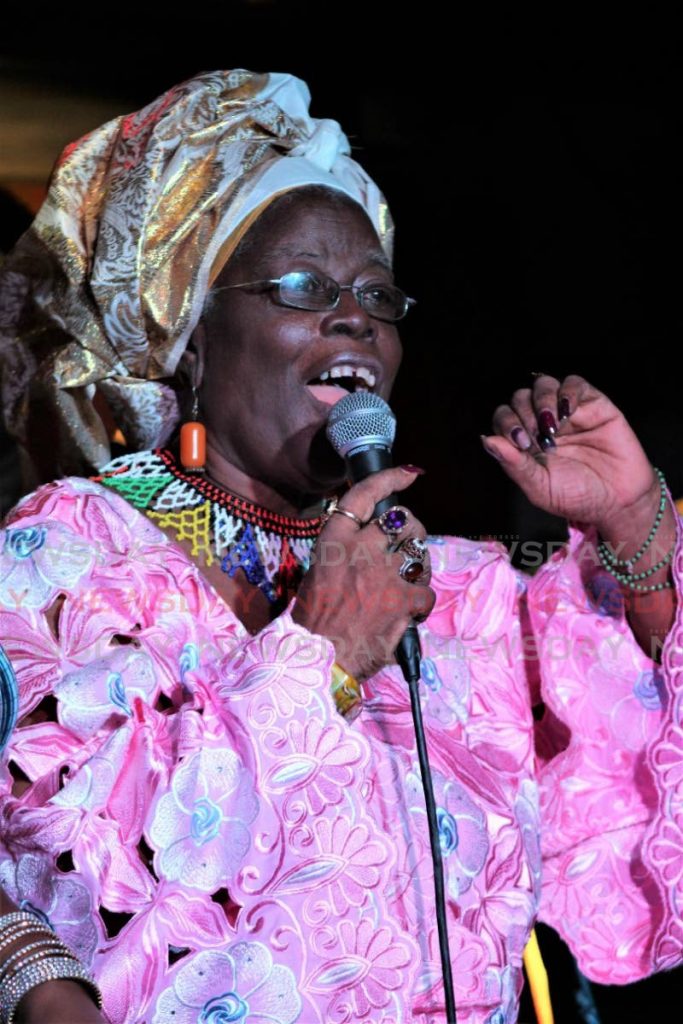Banjela the Orisha messenger

Addelon “Banjela” Braveboy, 40, has been singing since his childhood.
“I’ve been singing since I was seven years old. My mom told me every time she used to sing I would move and I would just be moving, I wouldn’t stay still. That’s how she knew from birth that I was different.
"I was always singing. I could remember singing to the pigs, beating the drums in school, making rhythm,” Banjela said in an interview at Newsday's Pembroke Street, Port of Spain office last month.
Banjela won the National Action Cultural Committee's (NACC) Young Kings in February with his song T’is We Season.
He grew up in a deep south village of Moruga and lives in Enterprise, Chaguanas for the past 20 years.
He remembers winning a lot of calypso competitions as a child at the St Augustine Basse Terre RC School. Some told him he was singing at a professional level at 15.
“Since I know myself, I’m always singing. Singing, dancing and singing."
He progressively grew as an artist in the past four years. He started competing for the Young Kings title in 2017, placing fourth with an original composition. In 2018 he placed second, in 2019, third, but the fourth time was the charm when he won first place.
He said his community rallied around him when he won the Young Kings title. A lot of people from Moruga reached out to him to say they always knew that would be his fate. He even got an award from the Chaguanas Mayor Vandana Mohit as the Young Kings titleholder.

- Vidya Thurab
With his home music studio, he composes his own music and writes most of his songs.
He wrote his Young Kings winning song three years ago from a dream he had with calypsonian Sandra DesVignes-Millington, also known as Singing Sandra, in it.
“I dreamt that winning song, so it was a dream come true. Those dreams became a reality.”
In the dream, he was on stage singing T’is We Season, and he heard Singing Sandra. When he looked on the stage, there she was, and she began to sing a duet with him.
“When I came out of the dream, I remembered the lyrics to the song and I started writing T’is We Season to break away, and eventually it came to life.”
Every year he asked her if she would do the song with him and though she agreed to make his dream come true and sing the song, they got delayed because she had to travel.
“This year she said, 'come pick me up, bring me to the production room,' and the rest was history.”
T’is we Season is a celebration of the Africanness of Carnival where society understands events such as the Canboulay riots and the spirit of revolution and resistance of the enslaved Africans.

“This is the thing our ancestors really had to undergo and showing that we as a people if we come together we can be a force to be reckoned with. This is bringing the love back into Carnival. Bringing the true essence of what Carnival is, the African history of Carnival. That’s what T’is We Season is all about.”
Banjela loves calypso as an artform, describing it as the community’s newspapers because that is how the country’s stories are told.
“It is something where you understand life scenarios. I pay much respect to the calypsonians because they were always known as the newspaper for us.”
He believes calypsonians play an important role in society.
“Things that we were not really fortunate to know what was happening in society, they bring the story in one platform for us to understand what’s happening.”
He sees himself and most calypsonians as messengers.
“Well, I always in social commentary. Hence the name Banjela. It is a Yoruba name and it means one who was commissioned by the Almighty to come to be successful and do what they are destined to do, and that is a messenger. Calypsonians are messengers. We bring the message to the people.”
Last year he sang the song Bring it Back which was a plea for the country to return to peace and harmony like it used to be in the good old days. He’s written songs such as Trinbago Unite and Wind of Change.
Shine was a story his grandmother told him as a child. He wrote that song and dedicated it to her.
“She told me it does not matter what happens in life, you continue to be that light. The will is in your DNA and you can reach far in your life once you know you are doing the right thing and following what you’re predestined to do. You continue to walk that path.”
He doesn’t just consider himself a calypso artiste, but an overall recording artiste as he sees himself as a versatile performer. He composes and sings love songs, soca and reggae. He’s currently working on a reggae album.
His music is on Spotify and Amazon for download.
Banjela is a jack of all trades. He’s an Orisha priest, a small business owner who does graphic design, a vocal coach and a licensed marriage officer.
When he won the Young Kings title, young people from his community in Enterprise sought him out for guidance. First, he told them to put down the guns, and that God gave all of them a talent, so they must find that talent and figure out what to do with it.
“They decided they want to do calypso next year, so I got at least two people already to sing calypso.”
Banjela said he was born into the Orisha faith, and in 1994 he had a vision to have the Orisha temple.
“My eagerness to find out my ancestral roots I went to Grenada because my name Braveboy is already from Grenada, found out my grandmother’s roots and found out they were keeping a lot of ancestral worship.”
He then went to Nigeria to get initiated in the priesthood.
People tried to dissuade him not to go by saying he would not have sufficient funds, but he kept his faith, saved religiously and made his pilgrimage.
“Eventually I said, this is the moment, I am going to the motherland.”
He is now Baba Awurela Fakyode, The High Chief Priest of Ojubo Orusha Omolu.
He founded the National O̩baluaye Festival on March 17, 1996, which honours the spirit O̩baluaye, which is associated with healing infectious diseases. The festival is held in his Enterprise temple.
“O̩baluaye is the spirit the almighty sent to protect us from the epidemics, and we are under a pandemic right now. Our prayers are based on asking the Almighty to protect and cover TT from the difficulties against this pandemic.”
The festival was cancelled this year due to the covid19 pandemic and the requirement to practise social distancing.
Banjela called on all his followers to use wisdom and heed the social distancing parameters the government has called for.
When asked if he performed in his temple Banjela said it is the Orisha tradition to be happy, but in moderation.
“Everything you do in life, it must be moderately. You can party, you can lime, you can have a good time, in the temple space we would not do certain things, but in the compound, we will have activities.”
Banjela sings the traditional Orisha songs. He used to do songs for Ella Andall and did Yoruba translation for her CDs. He considers her one of his icons.
“I used to eat by Ella and sleep by Ella, she’s the one who told me I could make it.”


Comments
"Banjela the Orisha messenger"